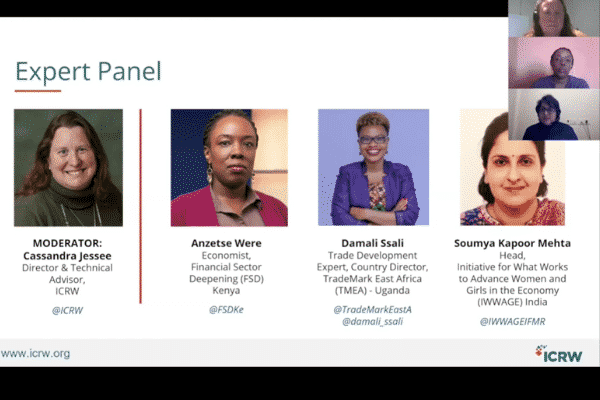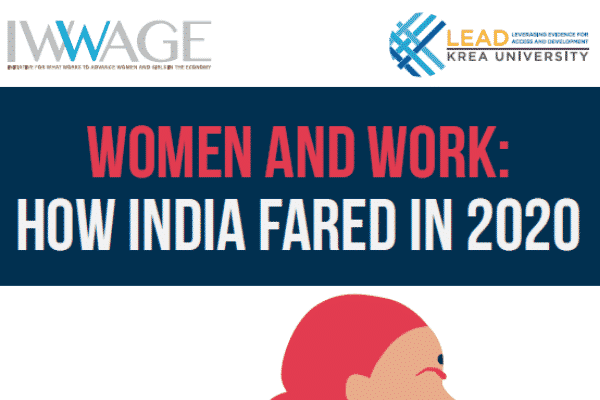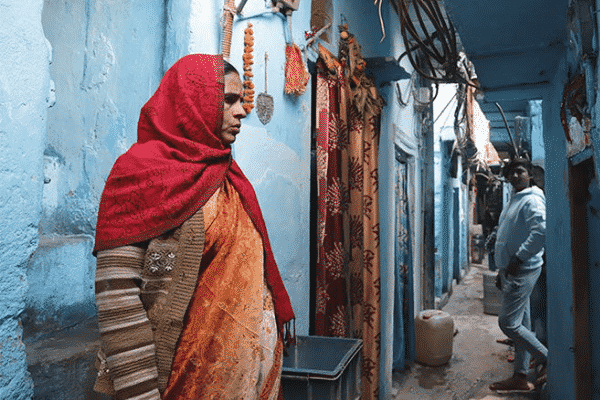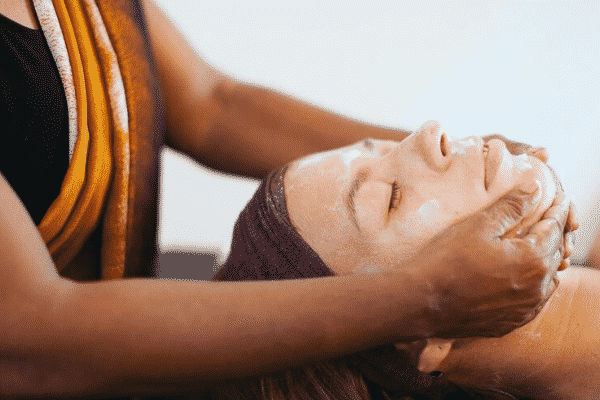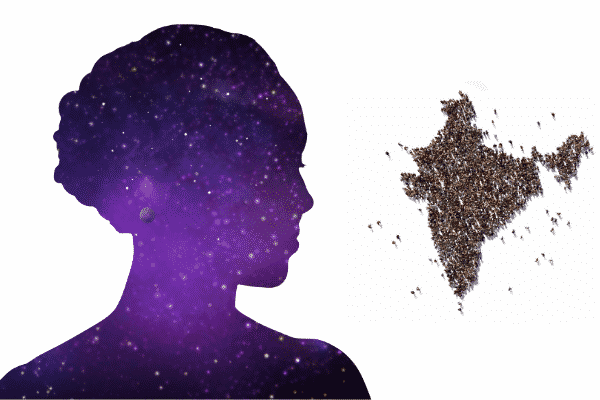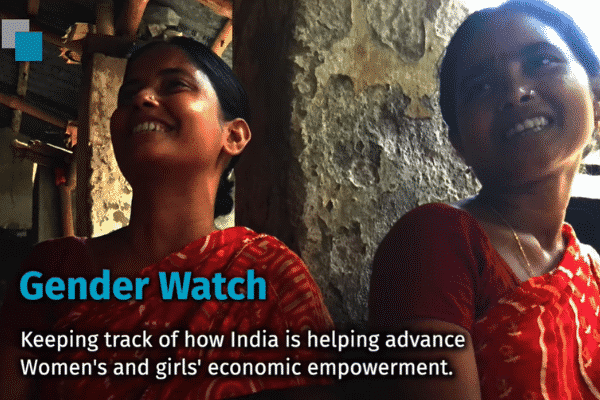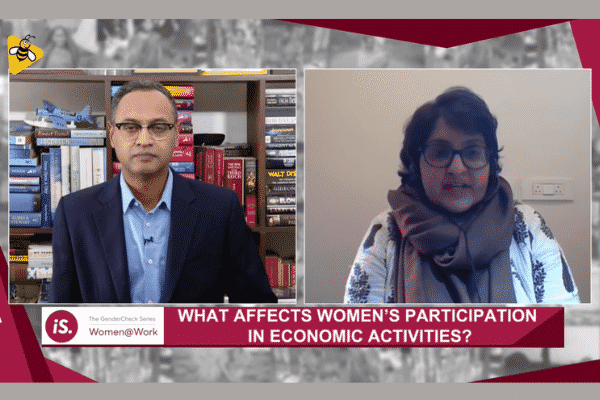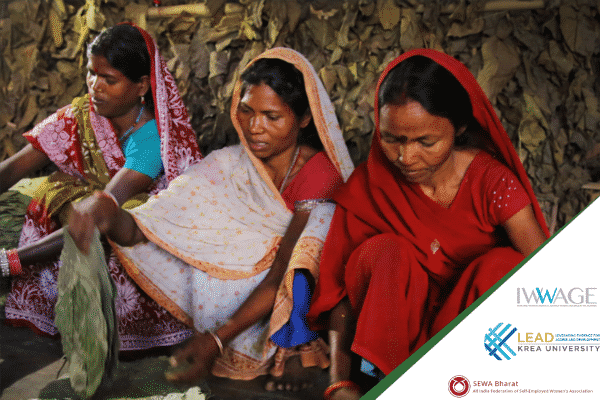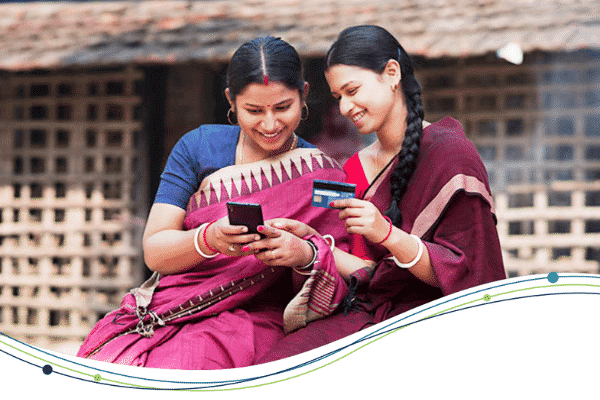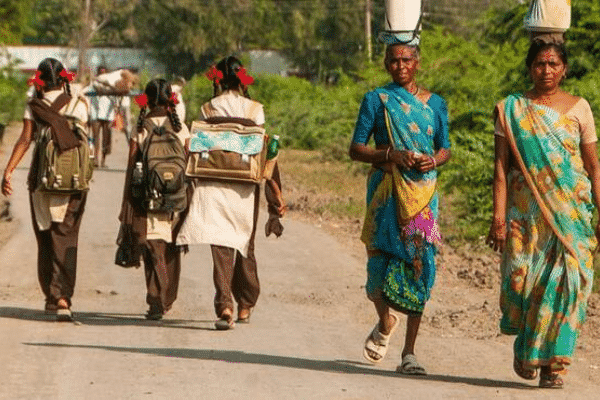Soumya Kapoor Mehta (Head – IWWAGE) was part of an expert panel organised by the International Center for Research on Women, sharing insights on the impact of COVID-19 on women in the informal sector in India. The panel discussion was part of an upcoming collaborative research, REBUILD, focuses on the current challenges faced by women in the informal economy under COVID-19, with the aim to understand better the social and economic impact of policy responses to the pandemic in India, Kenya and Uganda. View recording here.
Tag: iwwage
IWWAGE report captures pandemic’s impact on women and girls
A recent report by Initiative for What Works to Advance Women and Girls in the Economy (IWWAGE) has revealed that while the COVID-19 pandemic and the subsequent lockdowns affected people from all walks of life, the impact was relatively harsher for women and girls in India. The report, “Women in Work: How India Fared in 2020”, jointly commissioned by The Quantum Hub, highlights the labour participation rate, both at the urban and rural level. Read the full report here and its detailed coverage by Mint Lounge here.
Women@Work series: How the pandemic affected women workers in the Indian capital
India’s labour force participation rate was 50.2% according to PLFS, 2018-19. The pandemic seems to have further pushed people out of work. In the latest edition of IWWAGE’s ‘Women@Work’ series, IndiaSpend examines the situation for women workers in Delhi – envisioned as a world-class city – where employment rates (and attitudes) have been nearly static since 1981. While women’s work participation has been long invisibilised, the pandemic hit Delhi’s informal workers hard and many women lost jobs. Read the full report here.
IWWAGE-IndiaSpend report: Gig jobs give women higher incomes but little security
The pandemic affected a number of sectors, including the gig sector. Half of the gig workers lost their jobs and the other half had lost up to two-thirds of their income. From more than half of the gig workers earning more than Rs 25,000 per month in March, nearly 87% were earning less than Rs 15,000 in August 2020. Women workers reported being unable to work either because platforms had suspended their services or because they had to remain at home to take care of their families. IndiaSpend shares insights from gig workers and the challenges faced by them post lockdown. Read the report here.
Stories of resilience and leadership in the early months of the pandemic
According to data by the Centre for Monitoring Indian Economy (CMIE), at least four in 10 women in India lost their jobs during the early months of the pandemic. This translates to an estimated 17 million women who were rendered jobless in March and April 2020 itself, in both the formal and informal sectors. In this article, Soumya Kapoor Mehta (Head – IWWAGE) narrates stories of resilience and leadership displayed by a number of women and what one can infer from the data regarding women employment today. Read the article here.
‘Gender Watch’ – an informative video series by IWWAGE
IWWAGE brings to you a video series called, “Gender Watch” which presents in a capsule format news stories, data highlights and the latest research and thinking on gender issues in India, particularly related to initiatives and interventions to empower women economically. The launch episode can be viewed here. For upcoming episodes, visit the Gender Watch section.
Examining the barriers to women’s employment
IWWAGE and IndiaSpend have come together for a year-long partnership to examine and analyse issues around women empowerment and strengthen the narrative that will encourage and allow for equal participation of women in economic activity. The partnership kicked off with a video interview featuring Soumya Kapoor Mehta, Head – IWWAGE, as part of the Women@Work 2.0 series, examining barriers and solutions to getting more women in paid work. Watch the interview here.
Strengthening socio-economic rights of women: IWWAGE examines SEWA’s approach in West Bengal & Jharkhand
Women working in India’s informal sector face several vulnerabilities and are often denied decent working conditions and wages. Evidence shows that working poor in the informal economy, particularly women, need to organise themselves to overcome the structural disadvantages. SEWA’s programme in Jharkhand and West Bengal aims to increase the collective bargaining strength of the women informal workers, strengthen the workers’ movement, nurture and develop effective grassroots leadership; and also improve community’s access and understanding of basic services. The study, undertaken by IWWAGE in collaboration with SEWA, assesses the programme against these objectives with the aim to understand the impact of various components. Read the detailed report here.
Enhancing livelihood opportunities with digital solutions for SHGs in Chhattisgarh
In Chhattisgarh, IWWAGE is partnering with the State Rural Livelihoods Mission (SRLM) and Haqdarshak Empowerment Solutions Private Limited (HESPL) to train SHG members on a digital application, which can enhance their livelihood opportunities. In addition to collaborating on the implementation of this livelihood model, LEAD and IWWAGE are also conducting an impact and process evaluation of the Haqdarshak programme, which will answer questions on its effectiveness and efficacy. Read more about the project and the milestones here.
How official data miss details on half of India’s citizens
Lack of sex-disaggregated data and other gender-related gaps in Indian government’s official data sources is making it difficult to track issues such as girls’ and women’s employment, asset ownership, health, sanitation and education. This results in a limited understanding of gender issues and poorly designed policies and programmes. As part of their Data Gaps series, IWWAGE’s second story examines which women-specific data points are not collated or made public, and how this makes women invisible and hinders progress towards gender-equality goals. Read the article here.
